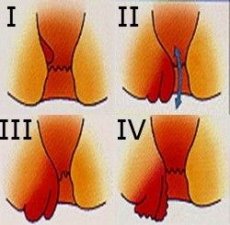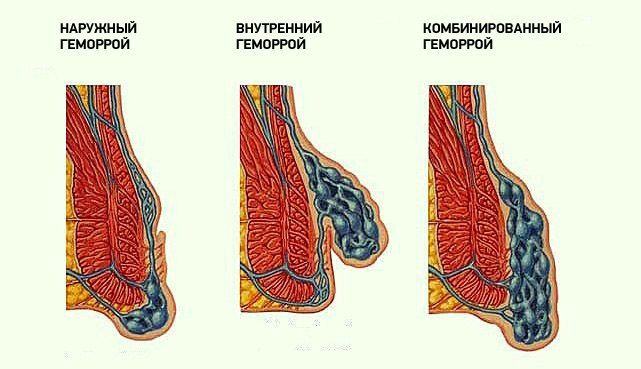Medical expert of the article
New publications
Types of hemorrhoids
Last reviewed: 04.07.2025

All iLive content is medically reviewed or fact checked to ensure as much factual accuracy as possible.
We have strict sourcing guidelines and only link to reputable media sites, academic research institutions and, whenever possible, medically peer reviewed studies. Note that the numbers in parentheses ([1], [2], etc.) are clickable links to these studies.
If you feel that any of our content is inaccurate, out-of-date, or otherwise questionable, please select it and press Ctrl + Enter.

Hemorrhoids are divided into types. They can be external, internal, combined. Each of these types of hemorrhoids is special and needs to be treated differently. There are also acute and chronic hemorrhoids. They are a special topic.

Chronic hemorrhoids
Chronic hemorrhoids are a disease that lasts for quite a long time and pain, discomfort and itching in the anus do not stop. With this type of disease, hemorrhoids may fall out or they may be inside.
External hemorrhoids
External hemorrhoids are formed when the lower plexus of veins in the rectum expands. These nodes are located lower than the dentate line of the rectum. These veins are also covered with squamous epithelial cells. These nodes may contain thrombi, which are quite painful - they contain blood clots.
When thrombosis is diagnosed as acute, a person has pain in the anus, sometimes it is a very sharp pain that is unbearable. The nodes can become ulcerated and blood can flow from them. Then hemorrhoids are diagnosed as bleeding. In addition, perianal fringes can occur due to thrombi. They are located in the anus and they can cause itching and discomfort during defecation. There may also be discharge from the anus.
 [ 4 ]
[ 4 ]
How is external hemorrhoids treated?
It is treated especially intensively when blood clots are found in the anus area, which can cause severe pain. Then doctors will use surgical intervention and surgically excise the hemorrhoids.
In order to ease the pain during the operation, local anesthesia is used. This operation does not require a long recovery, if a person is not inclined to lift weights, you can continue to recover at home, and not in the hospital.
Internal hemorrhoids
When a person is diagnosed with internal hemorrhoids, it is important to know that the nature of their formation is from the upper veins of the rectum, this is a plexus of veins that swells and forms hemorrhoids. They are also called pillows or cones. Their location is above the tooth line, and they are covered with cylindrical epithelial cells.
Acute hemorrhoids
It occurs if hemorrhoids were treated incorrectly or not treated at all. Considering the fact that only half of men and women seek medical attention for hemorrhoids, it is the second half that is the high-risk group for this disease.
What are the causes of acute hemorrhoids?
This is strong or weak bleeding from the anus, pain in the anal area, which is especially aggravated by defecation, as well as the inability to insert the fallen nodes into the anus. Symptoms of acute hemorrhoids are also thrombosis of external or internal nodes - hemorrhoidal cones or cushions.
Also, thrombosis is the most common cause of acute hemorrhoids, it can be accompanied by other symptoms. If a patient has thrombosis, especially acute thrombosis, then hemorrhoids will also be acute. Then the patient needs immediate medical care.
When acute hemorrhoids occur, the venous plexuses in the rectum swell, expand, the veins become inflamed, hurt, the mucous membrane of the rectum can become covered with ulcers and sores. This also leads to severe pain. At this time, a person has an increased level of the hormone prostaglandin, which accompanies inflammation.
What contributes to the aggravation of acute hemorrhoids?
When a person develops acute hemorrhoids, it is advisable to avoid factors that contribute to the aggravation of this condition. That is, do not lift heavy objects, do not sit in one place for a long time, do not eat spicy drinks and dishes, do not drink hot foods and temporarily refuse very hot dishes, and also avoid alcohol. You should also not strain during defecation, you need to wait until the rectum makes the necessary movements itself, pushing out feces.
Three degrees of severity of acute hemorrhoids
Acute hemorrhoids have three stages of progression. Doctors distinguish them depending on the symptoms and complexity.
First degree acute hemorrhoids
In the first stage of acute hemorrhoids, the nodes become the size of a pea - they are small. They are also tight, located below the dentate line of the rectum. When the doctor feels these nodes with his fingers or the person touches them, they hurt a lot. The skin in front of the anus is far from its usual color and shape - that is, it is hyperemic. People with acute hemorrhoids in its first stage complain of pain, burning and itching in the anus, which becomes much stronger during defecation.
Second degree acute hemorrhoids
In the second degree of acute hemorrhoids, a person has swelling and pain in the anus, hyperemia of this area. Pain in the anus and near it intensifies after palpation, if the doctor conducts a digital examination of the rectum, this is also very painful, it is not superfluous to administer local anesthesia. Pain in the anus is very strong. This pain intensifies when a person sits or stands or walks a lot.
Third degree acute hemorrhoids
In the third stage of acute hemorrhoids, a person experiences not only pain in the anus, but also tumors in the area of the anus. Doctors call this tumor inflammatory. When the doctor or the patient touches the nodes with their fingers, they hurt a lot. These nodes are purple-blue or red, they are clearly visible to the naked eye. These nodes are covered with fibrin films.
If a person does not receive normal correct treatment for this degree of hemorrhoids, the nodes may die, ulcers may appear on their mucous membrane, and these ulcers become black. There is a fibrin layer on the nodes. With this acute form of hemorrhoids, the nodes can become covered with a heavy purulent coating if they are not treated. This disease is called paraproctitis.
Therefore, with any type of acute hemorrhoids, you must immediately consult a doctor for examination and diagnosis.

